2. The Power of Place-Based Partnership
While there has always been collaboration, since 2021, through the Collaborative Newcastle Universities Agreement, Northumbria and Newcastle universities have been working more formally together with partners including the City Council, NHS and beyond to deliver for Newcastle and the wider region. This effort has been in direct response to the unique challenges of the region, focusing on initiatives that harness the potential of talented young people from all backgrounds and support economic growth and productivity.
The partnership demonstrates the combined impact of the two universities, utilising education and research as drivers of economic growth by enabling opportunity, providing a skilled workforce to the region, promoting entrepreneurship, facilitating collaboration with industry, and contributing to local communities.
Through their established partnership initiatives, the two universities have long been committed to creating opportunities and raising aspiration for young people from groups traditionally under-represented in higher education and from lower socio-economic backgrounds.

Widening access to higher education
The North East has long-term entrenched socio-economic barriers to participation in higher education. For those growing up in the region, 33 per cent attend universitycompared to a national average of 37 per cent. This is one of the lowest rates in the country, and is just another example of embedded regional disparities, in stark contrast to participation rates in London which stand at nearly 50 per cent3
Newcastle and Northumbria universities have a shared commitment to outreach and engaging with children and young people. Each has a range of programmes through which they engage with primary, secondary and FE students across the North East. Some activities are delivered in partnership, including with the other North East universities.
Newcastle University’s PARTNERS widening participation programme is one of the most well-established supported entry routes into higher education of its kind. Since it was established in 2000, the programme has enabled more than 9,000 students to study at Newcastle University.
5 Place-Based Partnership
3 Bolton, P. ‘Briefing Paper 7857: Higher education student numbers’, House of Commons Library 2021 [Online] accessed via https://commonslibrary.parliament.uk/ research-briefings/cbp-7857/
Image credit - John Millard / IntoUniversity
Student Case Study
Richardson Harry was encouraged by his teacher in sixth form to apply to the PARTNERS programme. He was subsequently accepted to study for a degree in Biomedical Sciences.
Richardson says: “The support I received from the PARTNERS team helped me to settle into university life very quickly. I grew my confidence and was able to make friends quickly. I also knew my way around my course; I had grown more confident in my decision to study biomedical sciences. I also learnt how to reference on the programme; I still use the notes today!
“I think PARTNERS is the perfect way to start your higher education path, it is perfect for enthusiastic learners like me, who have been affected by external circumstances that impacted my results. It’s amazing! One of the most valuable experiences of my entire life!”

6 Place-Based Partnership
IntoUniversity Newcastle East
IntoUniversity Newcastle East works with young people aged between 7-18, providing academic support, soft-skills development, and experience of higher education and the world of work to enable young people to achieve a university place or another chosen aspiration. It was established in 2021 jointly by the two universities in partnership with IntoUniversity, a national charity that partners with universities to provide local learning centres to support young people from disadvantaged neighbourhoods.
IntoUniversity staff provide sessions of structured academic study after school for children and young people from Year 3 to Year 13. The sessions raise attainment, encourage young people to become active, independent learners and help them to develop effective study skills.

Despite ongoing disruption from Covid-19 in the 2021/22 academic year, supported by students from both universities who volunteered as mentors, the centre exceeded all expectations, supporting over 800 young people during this challenging period.
One of the IntoUniversity centre’s stand-out achievements is that the progression rate to Higher Education for Year 13 students who participated is significantly higher than both the national and regional average. Progression from the centre stands at 67 per cent, compared to the regional average of 12 per cent, and a national average progression of 43 per cent.
Furthermore, 80 per cent of students involved in IntoUniversity Newcastle East reported that they were
performing better at school as a consequence of the academic support they received, while 73 per cent reported improved school grades.
A Year 10 student said of the IntoUniversity project: “At Academic Support I get help with my school work from supportive staff members and I get access to laptops, revision guides, and printing. I also get a chance to talk to new people that attend other schools, and new adults and volunteers too. Every week, at the end of the session, we have a debate about a topical issue. This helps me to improve my communication and confidence through public speaking and sharing my opinion respectfully, which also helps me in school. I tell all my friends about the opportunities IntoUniversity has given me and how much I appreciate having a safe and quiet space that helps me achieve what I want for the future.”
A teacher whose Year 6 class attended a FOCUS Week, a week of concentrated learning on a university degree subject culminating in a class graduation at a university, commented: “The most effective things about the programme were the very well organised, detailed sessions. The activities were well designed and so fun without pupils realising they were using and developing skills. The most important learning outcomes for the young people were the independent skills such as research, the team work skills, the presentation and development of speaking and listening, and the awareness of access to university opportunities.”
The universities are now working with IntoUniversity to identify potential areas for future centres in the city and region.
7 Place-Based Partnership
Image credit - John Millard / IntoUniversity
Regional action: the North East Raising Aspiration Partnership (NERAP) and Uni Connect Newcastle University is the lead partner institution for the North East Raising Aspiration Partnership (NERAP), in collaboration with Northumbria, Durham, Sunderland and Teesside Universities, and for the North East Uni Connect Programme, which is a collaboration of all the universities and FE colleges in the region.
NERAP’s core objective is to enhance higher education progression in the area while ensuring that young individuals receive comprehensive support in making well-informed decisions about their future. With a particular focus on under-represented groups within higher education, such as care leavers and those with caring responsibilities, the universities collaborate closely with other key regional stakeholders to address the unique challenges faced by these individuals.
NERAP provides a diverse range of free in-school and online workshops and activities for students from Year 2 to Year 13. Since its inception in 2014, NERAP has successfully delivered educational programmes to over 200,000 children and young people in primary and secondary schools throughout the region.

Newcastle and Northumbria have also taken a leading role in the North East Uni Connect programme which aims to foster a strong and sustainable collaboration between schools and higher education providers, aiming to enhance attainment levels at Key Stage 3 and 4 and maximise opportunities to work with external partners in support of the regional education and skills agenda.
The Care Leaver Covenant
National statistics reveal a significant disadvantage gap for care-experienced students, with only 13 per cent entering higher education at age 19 compared to 45 per cent of their peers4
Young carers also face challenges, experiencing lower educational attainment at GCSE level, with over 27 per cent reporting difficulties in balancing caring responsibilities with school or college work5. A recent study for the Carers Trust revealed that young carers are 38 per cent less likely than their peers to gain a degree6
In a significant milestone, NERAP became the first regional higher education partnership to collectively join the Care Leaver Covenant in early 2023. This national inclusion programme supports care leavers aged 16-25 in their journey toward independent living. By signing this agreement, the five North East institutions committed to consistently providing careexperienced students with the necessary support throughout their university experience. NERAP is committed to bridging the gap in support for careexperienced young people by providing consistent, high-quality support to care-experienced students and young carers throughout their educational journey.
As part of the commitment, NERAP has also created a new intensive programme of activities for careexperienced students in Years 7 – 13. ‘Choices Together’ supports young people to think about their futures and how higher education can help them reach their goals.
NERAP’s Care Leaver Covenant won the Widening Access Partnership of the Year at the 2023 National Education Opportunities Network (NEON) awards.
8 Place-Based Partnership
4 GOV.UK, Widening participation in higher education: 2020 <https://www.gov.uk/government/statistics/widening-participation-in-higher-education-2020> 5UCL News, Y oung carers less likely to graduate from university, University College London, 2023, <https://www.ucl.ac.uk/news/2023/may/young-carers-less-likely-graduate-university>“” 6“”UCL News, Young carers less likely to graduate from university, University College London, 2023, <https://www.ucl.ac.uk/news/2023/may/young-carers-less-likely-graduate-university>
Student Case Study
Harley McCourt is studying for a PhD in the state and fate of permafrost in mountain regions across the globe at Northumbria University.
Harley studied Physical Geography at Undergraduate level at Northumbria University before moving onto a Masters in environmental monitoring, modelling and reconstruction, and then onto his PhD.

Going to university has opened a lot of doors for Harley and as part of his Masters he visited the high Arctic
Harley grew up in Jarrow and was the first in his family to go university. He didn’t do as well as he wanted at A-levels but was able to study a Foundation Year at Northumbria before going on to get a First Class Honours degree.
Going to university has opened a lot of doors for Harley and as part of his Masters he visited the high Arctic to stay in a research basin within the Arctic Circle.
Harley really appreciates the support that he has received at Northumbria and from the Geography and Environmental Sciences Department. He believes he has grown as a person as part of this, as well as developing lots of skills that he can use more widely. Harley’s goal for the future is to develop his career in academia.
9 Place-Based Partnership
Student case study
Anthony Welsh, from Hebburn, in South Tyneside, is currently on a placement year in industry as a Software Developer and will be starting the final year of his Computer Science degree at Newcastle University in September. Anthony was aware his socio-economic background could potentially put him at a disadvantage. However, he has used his passion for technology and engineering to pursue his degree.
Anthony was shortlisted for a Technology Award in the fifth annual Student Social Mobility awards for defying the odds to achieve outstanding success. He said: “I’m over the moon to be considered for this award. It is an honour to be acknowledged in this way.

“The recognition of the preparation, hard work, and perseverance it’s taken to get to this point means an incredible amount to me. I want to set an example for others from similar backgrounds to make that journey and seek support to overcome those barriers.
“We need more diversity across industries, people with regional accents, people from working class backgrounds achieving excellence. This is fundamental to social mobility. When you can’t see someone who looks, speaks, or comes from a similar background as you in positions of influence, you can feel alienated.
“I hope the impact of these awards will help to pressure government and convince organisations to continue to invest in charities, social enterprises, and diversity, equality and inclusion initiatives. It’s in their interests to untap the potential that is out there.”
Alternative routes into higher education
Both Newcastle and Northumbria universities provide a range of educational pathways, such as foundation years and degree apprenticeships, to enable and encourage access to higher education in ways that suit individuals' background and aspirations.

Every year around 30 per cent of Northumbria’s students come to university through a foundation year, providing university experience and skills for individuals to progress onto the first year of their chosen degree programme.
This is often a route chosen by students who want to develop specific skills needed for their chosen degree that they have not previously studied, or if the entry requirements for their chosen degree have not been met. Students who start university on a foundation year have excellent retention rates and very strong outcomes in comparison to those who choose not to.
Both universities offer degree apprenticeships as an alternative route to attaining a full undergraduate or postgraduate degree qualification by offering learners the best of both worlds through combining university study with workplace learning. Northumbria University also has around 1,300 degree apprenticeship students combining work with higher-level learning leading to a degree.
Meanwhile, Newcastle University began delivering apprenticeships in September 2019, on digital and technical solutions specialist and senior leaders programmes, predominantly at Level 7. Apprentices on the digital and technical solutions specialist programmes develop skills that prepare them well for life and work in an evolving digital world, while Level 7 senior leader apprentices become skilled at managing change, initiating projects and creating reports and presentations for senior stakeholders. The University also supports the region’s workforce development with a growing portfolio of higher apprentices through its Lifelong Learning and Apprenticeship Hub.
10 Place-Based Partnership
Image credit - John Donoghue
Connecting Innovation and Skills
Universities play a crucial role in supporting economic growth through their research and innovation, educating the workforce of the future, through incubators for spin out and start up businesses, collaboration and knowledge exchange with industry and through attracting national and international investment and collaborations.
Newcastle and Northumbria Universities are actively engaging regional partners, to connect their research strengths with areas of growth in the economy. Crucially, this is aligned with their educational offer, developed with partners in Further Education and industry creating opportunities for local people to access the jobs of the future at all levels.
Green Economy
The North East is rapidly becoming the centre of the UK’s electrification revolution. Already the largest manufacturer of electric vehicles in the UK, over the next four years, it will also become home to the UK’s first two battery gigafactories. Combined with rapid growth in the renewables sector driven by the world’s largest offshore wind farm off the North East coast, at Dogger Bank, the region is set to benefit from the creation of thousands of new jobs. Delivering the electrification agenda will depend upon multiple factors, among the most crucial being advances in power electronics, machines, and drives (PEMD), battery technology, the

development of innovative manufacturing processes, and building an appropriately trained workforce.
The Institute of Electrification and Sustainable Advanced Manufacturing (IESAM), launched in November 2022, will benefit 7,500 learners through enriching T-levels, Higher Technical Qualifications, and Apprenticeship programmes. Newcastle University is leading a consortium of Further Education and Higher Education providers across the North East region to develop a flexible Power Electronics Machines and Drives training pipeline.
IESAM’s curriculum aligns with industry needs, encompassing Robotics, Automation, Control, and Digital Manufacturing. It also offers a Level 6 PEMD degree apprenticeship programme, professional development short courses, and an online toolkit to inspire young people towards education and careers in PEMD.
Private sector relationships are pivotal in the growth of the region’s sustainable energy sector. Collaborations with companies like Lockheed Martin and AEM Group highlight the innovative partnerships both Newcastle and Northumbria Universities are fostering. The establishment of these private sector connections, which contribute to quality job creation and investment, is a direct outcome of the universities’ emphasis on sector-leading research.
11 Place-Based Partnership
Renewable Energy Northeast Universities (ReNU) is a doctoral training partnership led by Northumbria, with Newcastle and Durham universities, backed by a strong portfolio of 36 partners including 27 companies (both SMEs and multinationals), non-profit organisations, local government and prestigious academic institutes across the globe. It trains and equips the next-generation of doctoral graduates with the skills required to drive UK innovation in renewable and sustainable distributed energy applications.
Newcastle University and leading renewables supplier, RWE, have signed a memorandum of understanding (MOU) to support the growth of a skilled offshore wind workforce, support the sector’s expansion and drive innovation.
The under construction 1.4 gigawatt (GW) Sofia is located on a 593km2 site 195 kilometres from the North East coast on Dogger Bank in the North Sea. With a landfall in Teesside, between Redcar and Marske-by-the-Sea, an offshore construction facility at the Port of Blyth, and an operations and maintenance base in Grimsby, a local skilled workforce will be vital throughout its lifecycle.
The MOU will build on the partners’ successful existing collaboration, which has included student dissertations; hands-on grid-related workshops; support of STEM careers awareness events and subject-specific guest lectures and seminars within Newcastle University programmes.
Northumbria University’s research specialises in new materials for energy and energy systems. This includes converting sunlight to electricity using new implementations of photovoltaics, and the conversion of carbon dioxide from greenhouse gas to sustainable products. It also focuses on the integration of energy technologies such as batteries and electric vehicles in the whole energy system, to deliver tangible carbon dioxide savings.
Together, the universities are training the upcoming generation of engineers and skilled professionals for the region to drive this transformative effort.
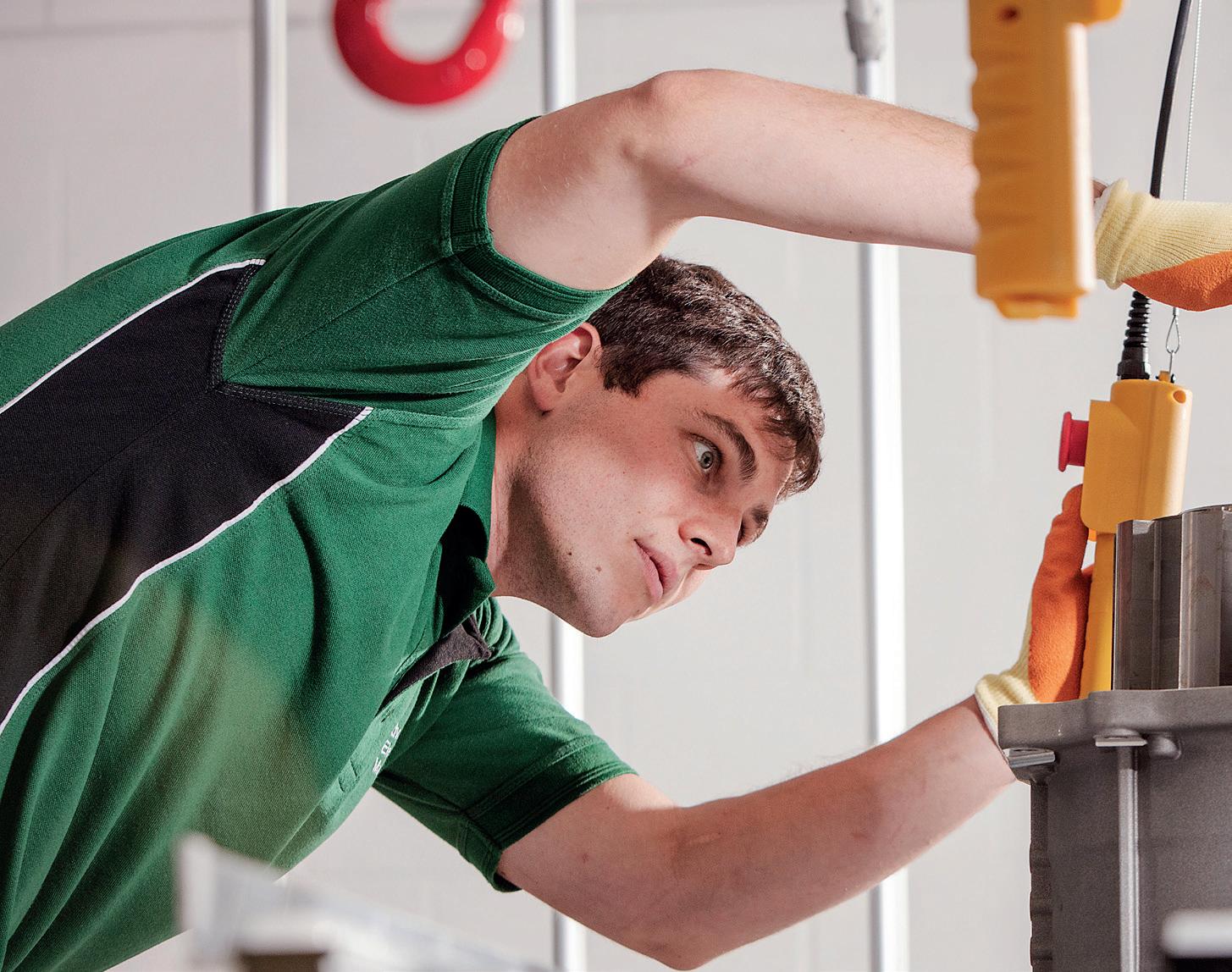
12 Place-Based Partnership
ReNU trains and equips the next-generation of doctoral graduates with the skills required to drive UK innovation in renewable and sustainable distributed energy applications.
Image creditKevin Gibson
EPIC: Transforming the UK’s battery industry
In response to the growing electrification challenge in the UK and globally, Newcastle University is leading the creation of the Electrification Process Innovation Centre (EPIC), working with partners to consolidate within one specialised unit regional research and skills training capabilities to exploit and accelerate the North East’s leadership in electrification, from batteries to electric vehicles to offshore wind turbines.
Crucially, EPIC will also support the establishment and growth of an appropriately skilled workforce. Skills provision is crucial to the North East’s potential to be at the vanguard of the UK’s future green economy.
EPIC’s long-term mission is to position the North East at the epicentre of electrification process R&D, creating jobs, and ultimately driving inward investment and economic growth that will help to keep the UK competitive in this rapidly evolving market.
Skills for Growth for the Green Economy
Northumbria University is commencing a new programme in Autumn 2023 under the North of Tyne’s Skills for Growth for the Green Economy programme. This will deliver three strands:

1. Sustainable Materials and Manufacturingto enable high-level upskilling for people working in chemicals, polymer science, materials science and the battery manufacture industry.
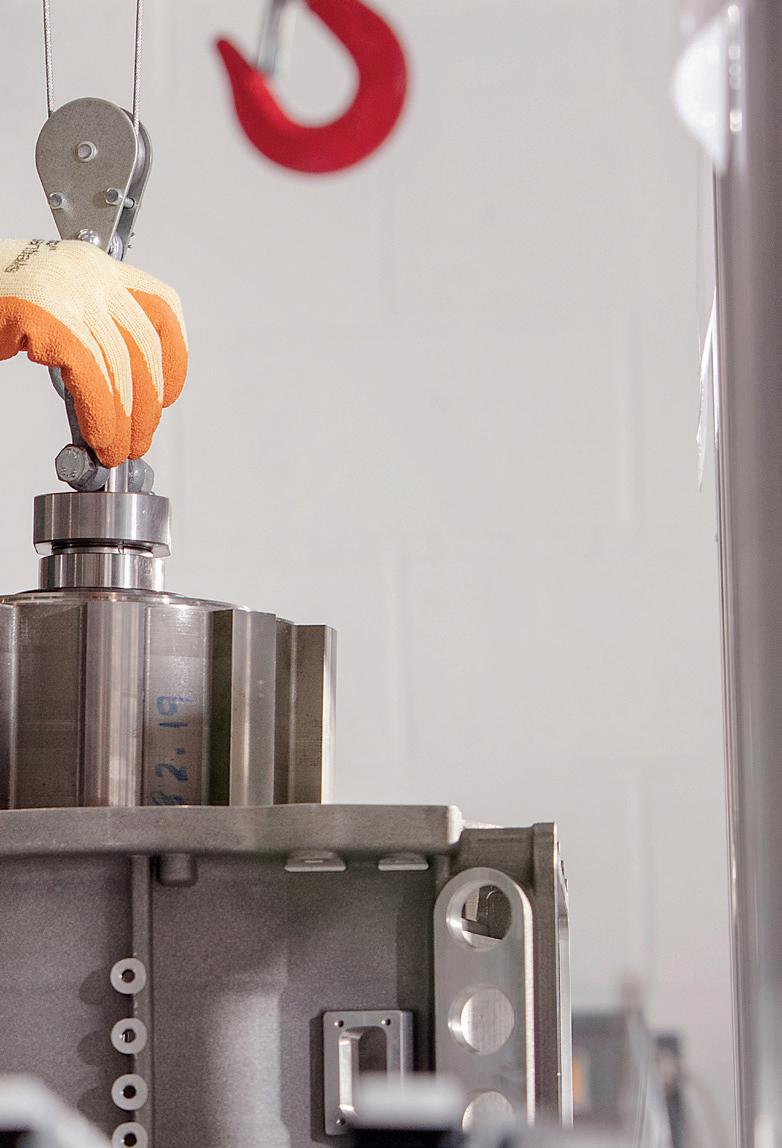
2. Sustainable Carbon Management - to develop a suite of courses that teach green growth skills at three different levels which will have certification from the Institute of Environmental Management and Assessment (IEMA), the leading environmental training accreditation body.
3. Skills for Sustainable Retrofit in the Housing Sector - to provide staff across the housing sector with the skills and knowledge to deliver the decarbonisation of existing housing stock. Addressing the skills requirements established in recent research by Northumbria University for North-East England Climate Coalition (NEECCo) and Northern Housing Consortium.
13 Place-Based Partnership
Skills provision is crucial to the North East’s potential to be at the vanguard of the UK’s future green economy.
Image credit - Chris Bishop
Health and Social Care
Health inequalities persist across the country today and subsequently impact the health, wealth and wellbeing of certain regions. The North East has the lowest life expectancy in England - around three years less than the best performing regions. The North East also has higher rates (6.9%) of bad/very bad health compared with the rest of England, highlighting the importance of the health and social care sector within the region7
The combined research strength of both Universities leads to innovation that underpins the health and social care sector. Add to this the education and re-skilling that they do and it is clear that the universities are creating opportunities for social mobility in the region.
Both Northumbria and Newcastle Universities play a key role in developing a talent pipeline for the NHS and ultimately ensuring that the workforce of tomorrow is ready for the changing needs of the healthcare system. This success not only ensures excellent medical services for the region’s population but also brings substantial economic benefits.
Together, the two universities provide workforce and professional development across the whole spectrum of health and social care roles.
Northumbria University is a leading provider of initial education and continuing professional development for a wide range of health professionals. The majority of students are recruited from the North East and remain in the region upon qualification. Its programmes are highly regarded with children’s nursing being ranked number one
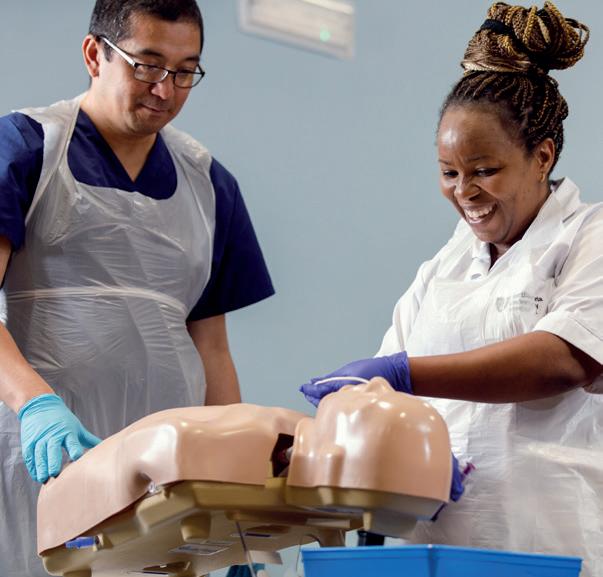
in the UK in the Guardian University League Table 2023 and nursing overall being ranked at 16 in the Complete University Guide 2024. The University encourages applications from a non-traditional background and many students are from low participation households. In addition to the standard 3 year undergraduate programmes Northumbria offers top up degrees enabling students to transition from nursing associate to full registered nurse.
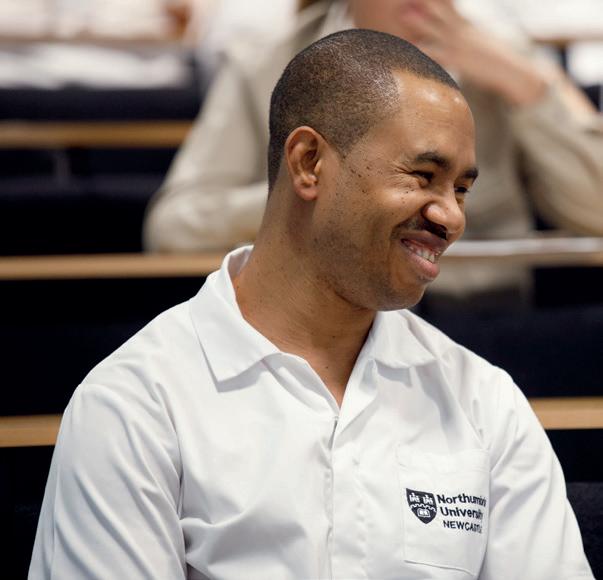
While, 100 per cent of students end up in skilled employment or in further study, a mean of 77 per cent of students are employed by local NHS and social care providers supporting the pipeline of talent needed by providers in the north east.
Newcastle University’s Bachelor of Medical Sciences (MBBS) degree programme educates around 360 UK and international students annually, making it the university’s largest programme. The Medical School has increased the proportion of widening access initiative participants to around 30 per cent. The University collaborates with organisations like the Sutton Trust and the Social Mobility Foundation.
Almost all graduates progress to foundation posts as junior doctors in the NHS, with up to 75 per cent choosing local Foundation Programme placements, reflecting high standards in the North East’s medical facilities.
The universities are developing skills pathways in health and social care with FE providers and partners, particularly focussing on the future of care models, such as digitisation and interdisciplinary approaches.
7 Health Equity North: 2023
14 Place-Based Partnership
<https://www.healthequitynorth.co.uk/app/uploads/2023/04/HEN-REPORT.pdf>
Student case study
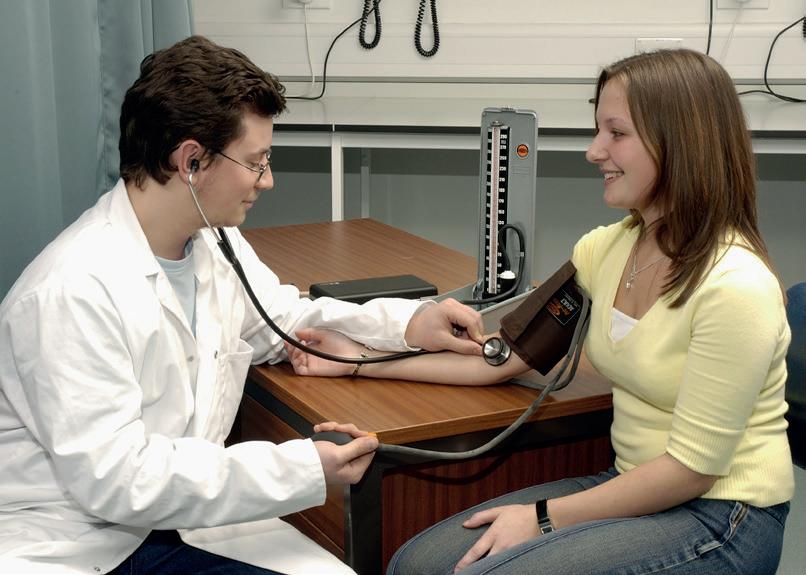 Abbie Kidner, Learning Disability Nursing Student, 2nd Year at Northumbria.
Abbie Kidner, Learning Disability Nursing Student, 2nd Year at Northumbria.
“I'm the first in my family to go to university. So, it's quite nice to be able to say. My parents and my family are incredibly proud considering they've come from such a working-class background and to be able to sort of get here and get this far, they've been so impressed.
“[Northumbria University is] very welcoming. I just felt at home here, it's a really great environment and a great way to learn for our future careers as nurses.
“There's a lot of different resources here, so we have the clinical skills centre on campus, which has a lot of simulation and dummies and situations that can be set up for any sort of situation you can think of in nursing, which is a really nice way to practice and get used to sort of working with people and communicating, ready for when you go on to placement. I feel more confident and easy approaching things like a cardiac arrest because I've had that experience here at Northumbria with my practice sessions.
“The lectures are really engaging. They offer lots of resources and extra reading that we can use in our coursework and they are all accessible before we go into lectures as well as we can have a read up with the slides and just see what we're getting into, what may be the things you want to read about.”
Health Innovation Neighbourhood
Newcastle University is leading the development of the UK’s first Health Innovation Neighbourhood (HIN) on a 29 acre brownfield former hospital site in Newcastle’s West End.
HIN will provide a real-world test-bed by bringing together the University’s research expertise in ageing and health, places and sustainability, data and digital science, and the creative arts to identify and implement solutions that aid healthier and more sustainable living across the lifecourse. Using a whole systems approach the neighbourhood will investigate, identify and implement new solutions to problems that limit people’s health and everyday lives.
HIN will provide spaces and opportunities to equip underserved communities with the skills and aspirations they need for the future. In doing so it will help remove barriers and improve life-long access to education.
Centre for Health and Social Equity
Northumbria University is making a significant investment in a flagship centre to address the key drivers of health and social inequality in the North East and beyond. By generating evidence-based policies and training the next generation of health professionals, CHASE will provide solutions to complex problems and identify policy changes for the benefit of all.
Due to open in 2027, the Centre aims to develop and harness the University’s research, education and knowledge exchange expertise to help meet the health and social needs of multiple stakeholders and communities in the city, region and beyond.
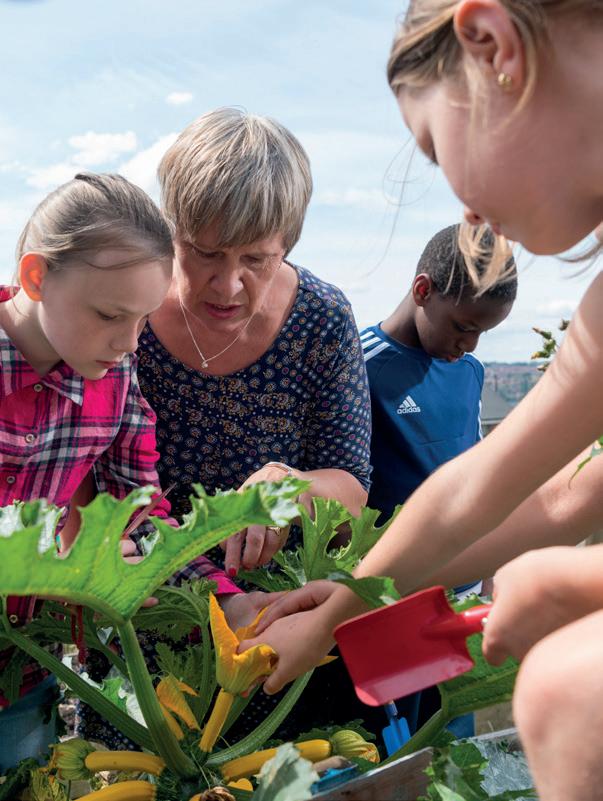
15 Place-Based Partnership
Driving Entrepreneurship and Business Development
The collaborative efforts of the universities extend across various projects, including partnerships with other regional universities to foster innovation, stimulate job creation, and facilitate the growth of SMEs across the North East, creating more high quality jobs and opportunities for local people.
Among these initiatives, Arrow 2.0 stands as a dynamic platform providing innovation support to SMEs to grow in the North East. The two universities are collaborating with Durham and Sunderland to support regional SMEs by connecting them with university expertise, strengthening the local economy. Over the last four years, Arrow has helped more than 150 regional SMEs innovate by connecting them with expertise from across Newcastle University, strengthening the local economy along the way.
Arrow simplified the process for SMEs to engage with the universities. It has increased collaboration across a range of HE research and innovation activities. The scheme leveraged the University’s expertise, assets and resources to help businesses to accelerate their own development and commercialisation programmes.
By pooling the collective expertise of all partners, this expansion aims to connect regional SMEs with knowledge and resources.
Commercialising research
Developing the intellectual property created by the innovative research taking place in Newcastle and Northumbria Universities into commercial products and services is also driving economic growth and creating jobs in the North East.
The Universities are partners in Northern Accelerator8, a bespoke service bringing together academics and business leaders that has transformed the commercialisation of research in the North East, addressing regional imbalances and strengthening the region’s knowledge economy.
Building on areas of research strength, Northern Accelerator’s focus is on building a pool of entrepreneurial
talent and leaders able to take forward commercial opportunities. To date, almost 350 academics have been trained in entrepreneurship, and 48 experienced business executives have been recruited to lead spin-out businesses.
Since 2016, Northern Accelerator has been responsible for the creation of 45 spinout companies employing some 650 people. Between them, they have raised in excess of £102 million.
Entrepreneurship and employability
Newcastle and Northumbria Universities both do exceptionally well when it comes to graduate entrepreneurship. Both Universities have been ranked in the top 10 in the UK for graduate start-up businesses based on turnover for the last 10 years, making an important contribution to job creation, economic growth and the development of an entrepreneurial ecosystem in the region.
Newcastle University’s Careers Service STARTUP team supports current students and alumni within three years of graduation. Students and graduates benefit from advice and support including, confidential oneto-one coaching and tailored business guidance, skills development, equity-free grant funding, co-working space and other opportunities.
STARTUP has supported over 200 businesses with a total annual turnover of over £155 million. Together, they've raised over £19 million in investment and created over 1,140 jobs.
In parallel, Northumbria University’s Student and Graduate Enterprise team are also highly successful in supporting the creation of start-up businesses with a turnover of £103m and the creation of more than 1,200 jobs.
The team helps students and graduates take ideas from concept stage to the creation of a business, with skills development, tailored support and training, and use of a dedicated co-working space, the Innovation Northumbria Incubator.
8 Northern Accelerator is a collaboration between Durham, Newcastle, Northumbria, Sunderland, Teesside and York Universities. 16 Place-Based Partnership
Start up case study
Newcastle University PhD graduate, Andrew Jenkins, set up his business Kinewell Energy, while he was studying at Newcastle. Andrew is developing and commercialising innovative technologies to accelerate the transition to net zero.
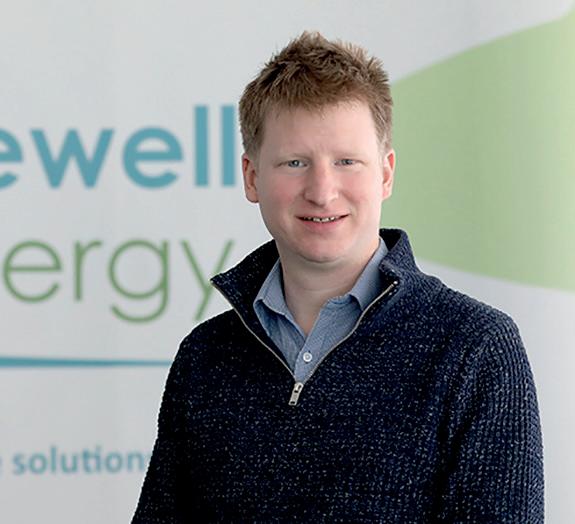
Recognised by Business Live as one of the ‘five most promising North East firms set for success in 2023’, Kinewell Energy is now a market-leader in developing cost-optimisation solutions for Offshore Wind and bespoke solutions using advanced mathematical and artificial intelligence techniques, with their software to optimise inter-array cable layouts of offshore wind farms being rolled out across the globe.
Start up case study
Imogen Russell, founder of The Little Sleep Group Ltd, first engaged with the Student and Graduate Enterprise Team (SGE) in May 2022, while still a student at Northumbria University. Her company offers expert baby sleep support for parents and carers across the UK. At the time, Imogen was operating as a sole trader and her clients were individual members of the public. Imogen based her business in the Incubator, Northumbria University’s dedicated business support hub and received one-to-one support from SGE Enterprise Adviser, Lee Longstaff as well as from external mentors’ expert in marketing, sales and UX design.
Imogen continues to be a regular user of the Incubator and has recently engaged with a team of Masters students from the University’s Business Clinic, to explore further growth of her company in both the public and private sectors.
Evidence to Support Future Policymaking
The Universities are testing new models of collaboration and taking a place-based approach to maximise the contribution to local communities. There is a need to understand what works and to measure impact to inform future policymaking.
Newcastle and Northumbria universities are founding partners in Insights North East (INE). INE uses the universities’ research to underpin and inform local and regional policymaking
Place-based policymaking INE aims to build a shared understanding of the knowledge and data within each partner organisation and develop new ways of connecting and interrogating that knowledge base so that regional policymakers can better address the needs of local communities. By building the capacity to make these connections across the region, INE will provide the evidence to guide effective decision-making on issues that involve billions of pounds of public spending.
INE is structured around three policy challenges that align with the expertise in the two universities and the priorities of policymakers in the region: improving health and wellbeing, a just transition to net zero, and delivering inclusive growth.
With support and funding from Research England’s Development Fund, INE is a demonstrator illustrating how anchor institutions like universities can collaborate to inform place-based policymaking and practice, ensuring that future research agendas are demand-led and shaped by the needs of their regions and communities.
Newcastle and Northumbria Universities are founding partners in Insights North East (INE). INE uses the universities’ research to underpin and inform local and regional policymaking
17 Place-Based Partnership
3. Conclusion and Recommendations
While the work already underway by Newcastle and Northumbria Universities through the Collaborative Newcastle Universities Agreement is impressive, both sides agree that more could, and should, be done.
It is crucial that the partnership continues to flourish and have a positive impact on the people of Newcastle and the North East. Key areas of focus for the Universities include:

• Building on collaborative social mobility activity, including IntoUniversity Centres;
• Working with colleges and employers to develop skills pathways in areas of growth in the economy; and
• Building on the collaborative INE programme to inform policymakers regionally and nationally.
This report outlines the positive social impact that can be made through a collaborative placebased partnership. Working together, and with others, Newcastle and Northumbria Universities have committed to improving social mobility and supporting inclusive economic growth in the region.
Through their approach to widening access, they are reaching those furthest from opportunity and addressing the low levels of participation in higher education in the region. Through their collective research, the institutions are driving economic growth in fast-paced industries such as the green economy and health and social care. Newcastle and Northumbria Universities are also helping to unlock opportunities for the region through their support of entrepreneurship and the re-skilling and growth of companies.
18 Recommendations 9 HESA: UK domiciled first degree 2018/19 leavers
All of these strands are feeding into the work that the Universities are doing to inform both national and regional policymakers and ultimately improve social mobility.
The collaborative place-based model outlined in this report has had great success and there is an opportunity to replicate this in other regions across the country.
Moving forward, the partnership is focussing on growing its impact in the following areas:
1. Engage local communities and stakeholders more in the work of the universities
The examples in this report show the progress and potential of Newcastle and Northumbria universities working together. Through the Collaborative Newcastle Universities Agreement (CNUA) there is an opportunity to engage local communities and stakeholders more explicitly about how they are increasing opportunities for a wide range of people across the North East and how those communities and stakeholders can be involved.

2. Play a leading role in the regional agenda and the new combined authority
In the run up to the elections for the North East Mayoral Combined Authority, Newcastle and Northumbria Universities have an opportunity to strengthen their relationship with local partners and other universities to shape the upcoming agenda in their role as knowledge anchors.
3. Become a national exemplar of how to connect opportunities around commercialisation and economic growth with an inclusion agenda
This report is a powerful example of the strength of partnerships. It could now be used as a model for how universities can work with industry, the public sector and a devolved administration in a place-based setting.
Newcastle and the North East region is a perfect test area for national agencies to look at new ways of place-based working. These agencies could be implementing genuinely place-based approaches for a whole system rather than a national approach with local implementation.
19 Recommendations



 0. Foreword
Professor Chris Day CBE, Vice-Chancellor and President of Newcastle University
Professor Andy Long, Vice-Chancellor and Chief Executive of Northumbria University
1. Executive Summary
0. Foreword
Professor Chris Day CBE, Vice-Chancellor and President of Newcastle University
Professor Andy Long, Vice-Chancellor and Chief Executive of Northumbria University
1. Executive Summary


















 Abbie Kidner, Learning Disability Nursing Student, 2nd Year at Northumbria.
Abbie Kidner, Learning Disability Nursing Student, 2nd Year at Northumbria.



